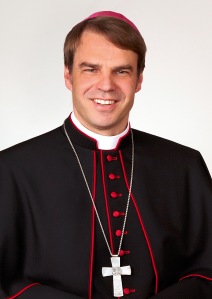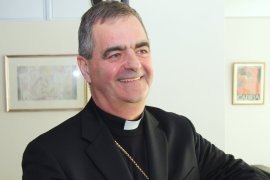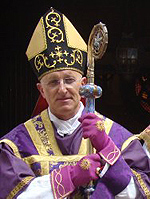Five years ago I wrote about the annual Echternach procession in honour of Saint Willibrord. In this year’s edition, which was held on Tuesday, Cardinal Wim Eijk gave the homily for the opening celebration. As archbishop of Utrecht and metropolitan of the Dutch Church province, he usually attends the procession, as St. Willibrord is the patron saint of the archdiocese, the Netherlands and Luxembourg (where he is buried iin Echternach abbey, which he founded in 698).

In addition to Cardinal Eijk and Luxembourg’s Archbishop Jean-Claude Hollerich and his predecessor Archbishop Fernand Franck, other prelates attending included the Apostolic Nuncio to Belgium and Luxembourg, Archbishop Giacinto Berloco; Bishop Frans Wiertz of Roermond and his auxiliary Bishop Everard de Jong; Bishop Felix Genn of Münster with his auxiliary Bishop Wilfred Theising; Bishop Jean-Christophe Lagleize of Metz, Bishop Stephan Ackermann of Trier and his auxiliary Bishop Jörg Peters; Bishop Theodorus Hoogenboom, auxiliary of Utrecht; Bishop Franz Vorrath, auxiliary bishop emeritus of Essen, as well as the abbots of Clervaux in Luxembourg and Sankt Mathias Trier, Kornelimünster and Himmerod in Germany. In total, there were 9,383 participants in the procession, which started at 9:30 in the morning and ended at 1pm.
Cardinal Eijk’s homily follows below:
 “Dear brothers and sisters,
“Dear brothers and sisters,
“Remember your leaders (that is, the Christian community leaders and pastors) who spoke the word of God to you. Consider the outcome of their way of life and imitate their faith”, we read in the Letter to the Hebrews (13:7). We do know to which community this letter was addressed. The author is similarly unknown. The background and the aim of the letter are, however, clear: the author is a pastor, who is worried as the faith in the community to whom he writes his letter is decreasing. Other ideas, which are alien to the Gospel, are being increasingly accepted: “Do not be carried away by all kinds of strange teaching” (Heb. 13:9). It is not said which teachings these are.
It is notable that the faith in this still young community is already under attack. The Letter to the Hebrews was written between the 70s and 90s of the first century, some forty to sixty years after the resurrection of Jesus, the first Pentecost and the beginning of the proclamation of the Gospel by the Church. When the decline has begun, it goes fast. This instinctively reminds us of the decline of the Dutch Church province in the 1960, which subsequently also became clear in other countries. This decline also took place in only a few years. We are flooded by new concepts and ideas that deny the Christian faith. In hindsight, our situation is comparable with the community to whom the Letter to the Hebrews was written. The advice to remember our leaders who first spoke the word of God to us, also goes for us.
Let us follow this advice. Saint Willibrord, who is called the Aposte of the Netherlands and who established Echternach Abbey, is one of the most important leaders who first proclaimed the Christian faith to us. What do we know about him? What characterised him and what drove him? How can he inspire us today? Willibrord was born in 658 in Northumberland (in the north of England). In his twenties he entered Rathmelsighi monastery in Dublin (Ireland) to prepare for a mission in the Netherlands. For twelve years he received a thorough education there. He got to know the spirituality of the Hiberno-Scottish monks. In 690 he came to the Netherlands with his companions. A year later he received from Pope Sergius I the mission to proclaim the Gospel among the Frisians. Willibrord expressly wanted to perform his mission in union with Rome and be a part of the entire world Church. During his second visit to Rome in 685 the Pope ordained him as archbishop of the Frisians and he received the pallium.
When we really want to know the spirit of Saint Willibrord and his motives, we must know a few things about the aforementioned Hiberno-Scottish monks. These did not strive for a systematic evangelisation and did not in the first place think of the creation of great structures and the establishment of dioceses. Their motive, to proclaim the faith, had in the first place to do with their focus on their own sanctification. They fostered an ascetical-mystical ideal: Like Christ during His earthly life and like His Apostles, they wanted to have no place to rest their heads (Matt. 8:20), and like them possess nothing and endure the suffering that would be theirs through rejection, misunderstanding, resistance and violence. They wanted to be what is called in Latin peregrini, meaning strangers or pilgrims, like Jesus and the Apostles themselves. It was their ideal to spread the good news like Jesus and the Apostles, as strangers without a permanent residence, following His call: “And everyone who has given up houses or brothers or sisters or father or mother or children or lands for the sake of my name will receive a hundred times more, and will inherit eternal life” (Matt. 19:29).
Willibrord and his companions wanted to heed this call and left their homeland with its already well-developed and widespread Christian structures, to proclaim Christ and His Gospel as peregrini among us on the European mainland. Willibrord experienced what it is to go with Jesus without being able to rely on established structures. He and his companions had the same experiences as Jesus during His earthly life. They too encountered misunderstanding and persecution. They found what it means that no slave is above his master (Matt. 10:24).
Of course, Willibrord also tried to rely on structures: he saught the protection of the Frankish royal house and established monasteries to support the mission. But in the beginning there were no structures at all. And what structures he established were frequently destroyed again, for example during a rebellion of the Frisians under their King Radbod. This also provides one of the explanations for the way in which the spring procession was held until 1947: with three steps forward and two back. This reflects the evangelisation, which in general was very fruitful, but not without times of serious setbacks.
As Willibrord and his companions could, at the start of their mission, not rely on permanent Christian structures, and as the structures they built were frequently destroyed again, their Hiberno-Scottish spirituality was not just their motivation, but also the most important means of their evangelisation. The direct imitation of Christ in their way of living gave them a strong personal charisma as disciples of Jesus. This was well-received: soon they were joined by missionaries from the areas they had evangelised, aglow with the same fire – like Saint Liudger, founder of the Diocese of Münster, born in Zuilen, a village near Utrecht and today a subburb of that city.
Can we not see a comparison here with what later happened multiple times in the Church? During the French Revolution and the the time after it, for example, the Church in western Europe lost many of her structures and took several steps backwards. But over the course of the nineteenth century the Church took many steps forward again.
Sadly we have to conclude that the Church has once again taken quite a few step back in the past fifty years. In the 1950s the communication of faith happened almost automatically, carried by our strong parishes, Catholic schools and other structures which played an important role in the past. Now even more than in the past, the advice is true: remember your leaders, who first spoke the word of God to you. Willibrord and his companions are an example for us because of their determination, based on the spirituality of the Hiberno-Scottish monks, to be on the road with Jesus, even without great structures, even in the face of opposition. That enabled them to withstand misunderstanding, criticism, opposition and setbacks and gave them the charisma of the disciples of Jesus during his earthly life. This was precisely what made their evangelisation – despite the frequently necessary steps back – very fruitful.
We have now taken steps backwards and can rely on ever fewer structures. We can’t literally follow Saint Willibrord, but we can be inspired by his spirituality. It not only shows us the way towards our own sanctification, but at the same time teaches us how we can proclaim the faith without structures of any kind. His spirituality, directed towards the development of a convincing personal charisma as disciples of Jesus, is, perhaps more than we realise, groundbreaking for the new evangelisation of western Europa. I am not a prophet, but we can anticipate that our current secular culture is not for ever and will at some point in the future be replaced by another culture. And who knows, perhaps then, in regard to our Christian structures, we can take a few steps forwards again. Amen.”
Photo gallery available here.


 “Dear sisters and brothers,
“Dear sisters and brothers, “The Fraternity of the Holy Apostles was established in 2013 as a “public clerical society of faithul” of diocesan right. It falls under the responsibility of the Archdiocese of Mechelen-Brussels.
“The Fraternity of the Holy Apostles was established in 2013 as a “public clerical society of faithul” of diocesan right. It falls under the responsibility of the Archdiocese of Mechelen-Brussels.
 “Dear brothers and sisters,
“Dear brothers and sisters,
 Archbishop Nikola Eterović has been the Apostolic Nuncio to Germany since November of 2013. Katholisch.de
Archbishop Nikola Eterović has been the Apostolic Nuncio to Germany since November of 2013. Katholisch.de  I was very happy to find this in the mail today: Sacred Liturgy: The Source and Summit of the Life and Mission of the Church, edited by Dom Alcuin Reid. It is the product of last year’s Sacra Liturgia conference, which I wrote about a few times.
I was very happy to find this in the mail today: Sacred Liturgy: The Source and Summit of the Life and Mission of the Church, edited by Dom Alcuin Reid. It is the product of last year’s Sacra Liturgia conference, which I wrote about a few times. Today the Dutch Bishops’ Conference published
Today the Dutch Bishops’ Conference published  The bishops and their coworkers make parishes aware of their missionary duty and the importance of decent catechesis in the parishes, which makes, attuned to the various stages of life, people familiar with Holy Scripture and the doctrine of the Church. In the past fifty years there has not been enough attention for systematic education in the faith in accordance with the teaching of the Church. A multi-year religious education program for children, youth and young adults, developed by employees of the Diocese of Roermond, is also promoted in other dioceses. Much is being done for a good formation of the countless volunteers who take care of catechesis in the parishes. On multiple sides means of assistance are being developed, such as pastoral care with an emphasis on presence in the concrete lives of people, the use of new media, the Alpha Course and initiatives of new movements.
The bishops and their coworkers make parishes aware of their missionary duty and the importance of decent catechesis in the parishes, which makes, attuned to the various stages of life, people familiar with Holy Scripture and the doctrine of the Church. In the past fifty years there has not been enough attention for systematic education in the faith in accordance with the teaching of the Church. A multi-year religious education program for children, youth and young adults, developed by employees of the Diocese of Roermond, is also promoted in other dioceses. Much is being done for a good formation of the countless volunteers who take care of catechesis in the parishes. On multiple sides means of assistance are being developed, such as pastoral care with an emphasis on presence in the concrete lives of people, the use of new media, the Alpha Course and initiatives of new movements. Policy and the joining of forces regarding the pastoral care of young people have led to a successful Dutch participation in the World Youth Days in Cologne in 2005 (3,500 participants), Sydney in 2008 (700 participants), Madrid in 2011 (1,250 participants) and Rio de Janeiro in 2013 (300 participants). The World Youth Days in Rio de Janeiro drew fewer participants because of the distance and the high costs related to the journey. Additionally, the previous World Youth Days (Madrid) took place only two years earlier, which made the time to save money shorter. The annual Catholic Youth Day draws every years some 1,500 young people from all over the Netherlands. The World Youth Days especially deepened the Catholic faith of many participants, as well as the formation of their personal prayer life and active participation in Church life. There is special attention for the follow up of the World Youth Days through youth activities in the dioceses and on a national level. The dioceses also develop their own programs for youth activities.
Policy and the joining of forces regarding the pastoral care of young people have led to a successful Dutch participation in the World Youth Days in Cologne in 2005 (3,500 participants), Sydney in 2008 (700 participants), Madrid in 2011 (1,250 participants) and Rio de Janeiro in 2013 (300 participants). The World Youth Days in Rio de Janeiro drew fewer participants because of the distance and the high costs related to the journey. Additionally, the previous World Youth Days (Madrid) took place only two years earlier, which made the time to save money shorter. The annual Catholic Youth Day draws every years some 1,500 young people from all over the Netherlands. The World Youth Days especially deepened the Catholic faith of many participants, as well as the formation of their personal prayer life and active participation in Church life. There is special attention for the follow up of the World Youth Days through youth activities in the dioceses and on a national level. The dioceses also develop their own programs for youth activities. The social relevance of the Church plays a role in her relation to the government, the society, the other churches and church communities, as well as to other religions and philosophies. An important tool is the allocated broadcast time for the Roman Catholic Church (RKK), which the Dutch Bishops’ Conference and the Katholieke Radio Omroep (KRO) fill in cooperation. National government carries the costs for the RKK. This time offers special opportunities to reach Catholics and non-Catholics. But the government has decided to stop financing the RKK and withdraw the licenses of all religious broadcasters, so also including the RKK, in 2016. That is why it is important that the KRO continues expressing her Catholic identity in her own broadcast time. In cooperation with the bishops, the KRO will take over the broadcast of the Sunday Eucharist and a few programmes of the RKK. In addition, the bishops are investigating if there are more affordable means to broadcast programmes with a Roman Catholic identity, for example via Internet television and radio.
The social relevance of the Church plays a role in her relation to the government, the society, the other churches and church communities, as well as to other religions and philosophies. An important tool is the allocated broadcast time for the Roman Catholic Church (RKK), which the Dutch Bishops’ Conference and the Katholieke Radio Omroep (KRO) fill in cooperation. National government carries the costs for the RKK. This time offers special opportunities to reach Catholics and non-Catholics. But the government has decided to stop financing the RKK and withdraw the licenses of all religious broadcasters, so also including the RKK, in 2016. That is why it is important that the KRO continues expressing her Catholic identity in her own broadcast time. In cooperation with the bishops, the KRO will take over the broadcast of the Sunday Eucharist and a few programmes of the RKK. In addition, the bishops are investigating if there are more affordable means to broadcast programmes with a Roman Catholic identity, for example via Internet television and radio. As announced today, Pope Francis will be releasing his first encyclical on Friday. Titled Lumen fidei, “The light of faith”, it has been co-authored by Pope emeritus Benedict XVI. Pope Francis has reworked a draft created by the emeritus pontiff, and as such the encyclical will be the third in a series on the theological virtues of hope, charity and faith. Benedict XVI published
As announced today, Pope Francis will be releasing his first encyclical on Friday. Titled Lumen fidei, “The light of faith”, it has been co-authored by Pope emeritus Benedict XVI. Pope Francis has reworked a draft created by the emeritus pontiff, and as such the encyclical will be the third in a series on the theological virtues of hope, charity and faith. Benedict XVI published  “Thank you for your presence this evening.
“Thank you for your presence this evening.